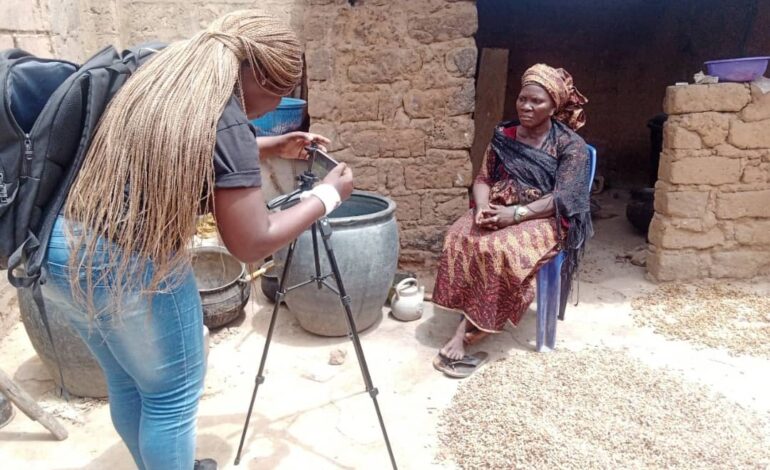Titilope Fadare, an award-winning multimedia journalist with Premium Times is a Mobile Journalism Trainer. She is a 2021 Fellow of the Female Reporters Leadership Programme by the Wole Soyinka Centre for Investigative Journalism.
In this interview with Blessing Osemobor, Fadare shares insights about mobile journalism, the impact, prospects and challenges.
What is mobile journalism?
Mobile journalism is about being equipped with the skill of producing and editing videos on a mobile phone. Instead of using the usual hardware camera, you’re making use of your mobile phone to capture events, edit, produce and publish on whatever platform you want to publish.
It’s an easier means because there are places where mobile phones will be easily accessible and there are places where cameras cannot be accessible. For instance, if there’s an immediate incident in a place, and the office camera is not available immediately, the accessibility for mobile phones is easier because you can just bring up your mobile phone and get to work immediately than going to the office to get a camera.
There are also places where you would want to go undercover, you cannot necessarily carry a camera because it’s going to attract attention. Your mobile phone just basically helps you cut corners in places where the normal cameras will not be able to take you. It’s about producing video content on your phone from scratch to finish, producing, capturing and to the publication of the content.
How long have you been practising mobile journalism and what is the impact on the media industry today?
I started in 2020, about two years. Its impact on journalism is massive. It helps the newsroom to easily adapt to new trends in journalism. Not to be left behind, to be able to serve a diverse audience as much as possible without being left out. It’s about innovation. So, having a smartphone basically means you can do mobile journalism. It’s really impactful. Newsrooms cannot easily be left out in producing the content they want to produce for their audience.
READ ALSO: 7 mobile tools every journalist will find helpful
What have you done so far with mobile journalism and how can other journalists embrace this useful tool to enhance their journalism practice?
Many media outlets have integrated mobile journalism into their framework as a complement to its traditional reporting. So far, I’ve trained staff of Premium Times in Abuja and The Nation Newspaper in Abuja. I’ve trained interns at the Independent Television in Abuja, The Leadership Newspaper in Abuja and I’ve also trained CSOs and journalists in Adamawa state.
A lot of my production as a multimedia reporter in Premium Times initially was a result of mobile journalism and a lot of video content. Premium Times is a very good advocate of mobile journalism because most of our content are usually produced with mobile phones and our reporters are trained. Even The Nation Newspaper after the training made it mandatory for their staff to be able to produce content using their phones whenever they go to events. For every investigation we get to do in Premium Times, the reporters are mandated to take videos which are also used as an evaluation requirement when we want to do an in-house performance review. So newsrooms are beginning to imbibe this.

How did you come about mobile journalism and how is it different from other forms of journalism?
I came about mobile journalism in 2020. I saw on Twitter a promoted content, and advertising training on mobile journalism organised by Facebook in collaboration with ICFJ and Hashtagourstory (a digital platform based in the US that basically promotes Mobile journalism).
They were supposed to train 10,000 African journalists. The training was done on Facebook – a six months programme. The first three months were like a scheduled course on the Facebook group and we had a series of assignments to do. Afterwards, they shortlisted about 40 or 50 out of 10,000 people. We had another three months of training where they shortlisted the winners from the shortlisted 40 or 50 people; where I emerged as one of the winners. From there I just got attracted to it because I’ve always had flair for broadcast and mobile video editing, but I didn’t know how to exactly go about the practical aspect of it.
My mobile journalism for the editing aspect was more self-taught but for the aspect, I learnt from the programme. Mobile journalism to me is more like evidence-based journalism when compared to other genres of journalism. It makes your work very easy, it helps newsrooms to be more effective; especially, newsrooms that do not have the resources to get huge cameras to be able to produce good content. Mobile journalism is like a replacement or a substitution for it and you can improvise with it and as well get the work done.
Is Mobile Journalism Broadcast Journalism? Is it limited to the broadcast medium alone?
No! Mobile Journalism is not limited to the broadcast or print media. But it’s a communication tool basically. I do tell my colleagues that these days if any newsroom wants to hire you, they won’t hire you based on the fact that you’re just a print journalist or you’re just a broadcast journalist or even a broadcast journalist. They expect that you’re a one-man or one-woman band journalist so they expect you to know how to produce, present, edit, and know how to basically package news content. So, I usually advise that journalists should not stick to what they know alone, be it writing or whatever, try and equip yourself with innovative tools that will make you a hotcake basically so that whenever you want to transition or grow your career people will know and see that you have been able to do this beyond the normal thing that you know. This makes you more versatile, and more recognized because you’ve trained yourself to acquire more skills.
What do you need to know and have to practice mobile journalism effectively?
You need your mobile phones and some gears which are optional, although they enhance the quality of your production. You need to have your lapel mic, your tripod stand, and a gimbal, but basically just having a phone, a tripod stand and a lapel mic you’re good to go. The tripod stand will help you stabilise your shots, the microphone will help you improve the sound of whosoever you’re interviewing.

What are the challenges of Mobile journalism?
Anything that is produced with technology definitely does have its challenges. In mobile journalism, in as much as you’re using your mobile phone, it’s important you also have a very good phone because that also reflects the output of whatever content you’re producing. Even if you can make use of whatever phone, it’s usually advisable to go for a high-quality phone. This will give you very good output. You will have challenges with space over time because you’re doing lots of videos, and your phone will always be full. It’s advisable to have a hard drive where you transfer your files so that your phone is constantly empty to get in more videos. Transferring videos from one app to another app sometimes can affect the quality of your video, that’s another challenge.
What is your advice to journalists who are already practising and students journalists, who are upcoming?
Mobile Journalism makes journalistic video productions more affordable, flexible and faster. It’s important for every journalist to embrace innovation. This is to make their work easier and better, simpler. The most important thing is to keep people informed. So whatever format you have to use to keep people informed, you have to be abreast of it basically. You need to embrace every aspect of journalism and mobile journalism is one of them.




